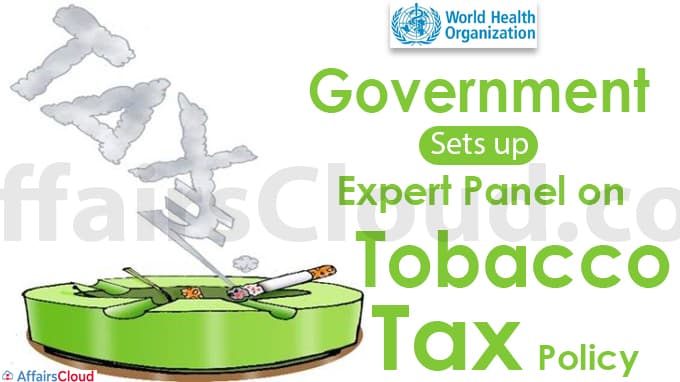 On October 19, 2021, the Ministry of Health and Family Welfare (MoHFW) set up an expert group headed by Vikas Sheel, additional secretary in MoHFW to develop a comprehensive tax policy for all tobacco products (smoking & smokeless).
On October 19, 2021, the Ministry of Health and Family Welfare (MoHFW) set up an expert group headed by Vikas Sheel, additional secretary in MoHFW to develop a comprehensive tax policy for all tobacco products (smoking & smokeless).
Reason to develop Tobacco Tax Policy:
To prepare a roadmap for reducing tobacco demand according to World Health Organization’s (WHO) plans.
Composition of Expert Group: 9 members
i.There will be 9 members in this group including Vikas Sheel; Dr Pulkesh Kumar, deputy secretary, MoHFW (Will be the Co-ordinator of the panel); and Dr Rijo M John, health economist.
ii.There will also be Representatives from the Goods and Services Tax (GST) Council; NITI (National Institution for Transforming India) Aayog; Central Board of Indirect Taxes and Customs (CBIC), the revenue department’s tax research unit; WHO country office for India; and National Institute of Public Finance and Policy (NIPFP)
Responsibility of Group:
i.Analyzing the current tax structure of all forms of tobacco, including smokeless tobacco, and suggesting various tax rate models for the preparation of the FY23 (2022-23) and future Union budgets.
ii.Recommend immediate steps to be taken for making India ‘MPOWER’ compliant with regards to ‘R’ component (highest level of achievement).
- MPOWER measures were introduced by WHO in 2008 on the lines of WHO Framework Convention on Tobacco Control (WHO FCTC). Click here to read more about it.
How will taxation policy on tobacco be helpful?
Reducing Tobacco Demand:
Currently, Tobacco products are in the 28% GST (Goods & Service Tax) slab and tobacco leaves are taxed at 5%. As Tobacco and its forms are sin goods they attract heavy burden of cess viz. 65% on unmanufactured tobacco and for cigars, it is 21% or Rs 4,170 per 1,000, whichever is higher. However, there has not been any major increase in tax on tobacco products since 2017.
- The tax as a percentage of the tax-inclusive retail price is about 52.7% for cigarettes, 22% for bidis, and 63.8% for smokeless tobacco. This is much lower than the WHO recommended tax burden of at least 75% of retail price for all tobacco products.
Therefore, the Central Government has decided to increase the price of tobacco products through tax increases resulting in decreased affordability, encourage users to quit, and reduce initiation among non-users.
Raising Central Government Revenue:
An increase in existing compensation cess on tobacco products and levying compensation cess on bidis can address the immediate need of raising Central Government’s revenue. This revenue will be utilized to compensate states for their respective GST revenue shortfalls during the COVID-19 pandemic.
- Notably, GST revenue receipts of both central and states government have been affected adversely by the pandemic. This led to the inability of the Central Government to distribute compensation cess dues to different state governments as guaranteed under the GST framework.
Recent Related News:
WHO has awarded former Union Health Minister Harsh Vardhan with ‘WHO Director-General Special Award’ for his accomplishments in the area of tobacco control. Harsh Vardhan was awarded for recognizing his efforts in the 2019 national legislation to ban E-cigarettes & heated tobacco products.
About Ministry of Health and Family Welfare (MoHFW):
Union Minister– Mansukh Laxmanbhai Mandaviya (Constituency– Gujarat)
Minister of State (MoS)– Bharati Pravin Pawar (Constituency- Dindori, Maharashtra)




